Welcome to DU!
The truly grassroots left-of-center political community where regular people, not algorithms, drive the discussions and set the standards.
Join the community:
Create a free account
Support DU (and get rid of ads!):
Become a Star Member
Latest Breaking News
Editorials & Other Articles
General Discussion
The DU Lounge
All Forums
Issue Forums
Culture Forums
Alliance Forums
Region Forums
Support Forums
Help & Search
General Discussion
Related: Editorials & Other Articles, Issue Forums, Alliance Forums, Region Forums🎗️ Preparing for Election Day - a Mobilizing Guide for DU Activists 🎗️ (23 Days to Go)
“Democracy is not a spectator sport. VOTE!”(Thanks to aggiesal for their signature line)
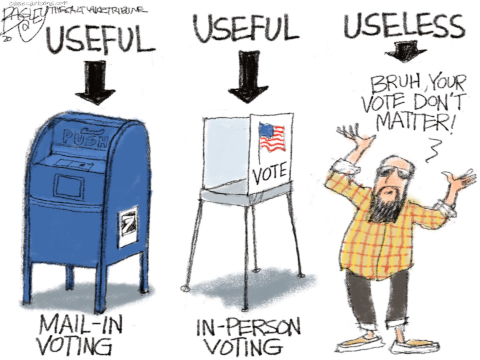
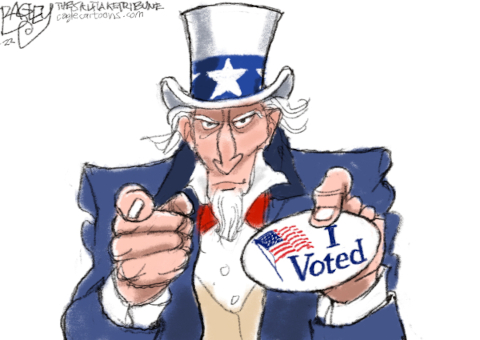
I created this guide so we here at DU can get the maximum possible turnout we can! If we push for a near-record turnout, we win!
I compiled this list from several sources.
Updated every day until Election Day.
Get Out the Vote
In recent decades, about 60% of the eligible voting population votes during presidential elections and about 40% during midterm elections.
What can we do to get out the vote?
1. Volunteer at a Phone Bank
Phone banks can be a lot of fun. They’re usually set up in offices that have been filled with telephones and access to a computer so you can easily make a call and also record the results of the call. Sometimes you get through to the voter and have a good conversation. Sometimes people remain undecided. Either way, you’ve made “voter contact” that can help boost turnout. Plus, phone banks usually have great snacks! Volunteers are needed to participate in a mix of different types of phone-banking, such as: calling voters who have indicated they are, or may be, in need of voter ID assistance; calling voters likely to have voting questions calling organizations that may be interested in using VoteRiders’ tools and services. Sign Up Here.
Phone Banks For Democrats:
https://events.democrats.org/?event_type=2
2. Phone Bank from Your Own Home
If you can’t get to an actual phone bank, campaigns may set up a digital system you can log into from your home computer. On the weekends, calls might be made between 10 a.m. and 6 or 7 p.m. During the week, calls are often made in the afternoon up until 9 p.m. You can sign up for as much or as little time as you have available.
3. Canvas Door-to-Door
Of the many ways you can help persuade undecided voters, knocking on their doors is evidently the most effective. It is the number one most powerful way to convince undecided voters to support our candidate.
4. Write Postcards.
Volunteer to personally reach out to voters by writing and mailing postcards with VolunteerBlue. Just an hour or more a week can make a difference!
“Hand written postcards improve voter turnout” thread on DU:
https://www.democraticunderground.com/100216987805
Here’s a good thread on what to write when composing such postcards:
https://www.democraticunderground.com/100217289158
5. Write Letters. VoteForward letter-writing program is currently targeted towards voters who are likely to have voter ID and voting-related questions. Volunteers “adopt” a number of voters, and then are provided with templates to help craft letters.
Again, if you’re looking for inspiration when composing your letters, consider this thread:
https://www.democraticunderground.com/100217289158
Got post-its? Stick 'em up for a blue wave! Thanks to Sky Jewels for this idea:
https://www.democraticunderground.com/100217078977
6. Host a House Party
If you’re in a community where you know there are a lot of undecided voters, host a house party. Invite your neighbors in to discuss what they care about, and make sure you know where your candidate stands on the most important issues at stake. Some local candidates may drop by your house party to meet voters and answer questions!
7. Attend a Candidate Debate
Though it’s difficult to score tickets for a presidential debate, it’s much easier to get into a debate among candidates running for state and Congressional office, like governor or U.S. Senator. Attending a debate gives you a lot of credibility when you do other kinds of voter contact. You can say, “I was at the debate, and I was struck by Candidate X’s approach to solving this problem you care so much about.” Plus, it’s so cool to be in the room.
8. Help Register People to Vote
No matter how much money candidates spend on ads, only one thing really matters on Election Day, and that’s how many people vote. Clearly, the more people who are registered to vote, the better. RocktheVote lists voter registration deadlines in every state. Also, contact your local League of Women Voters and check out Clean Air Moms Action to find out how you can help.
9. Drive Voters to a Dropbox or a Polling Location
Many elderly and ailing people would happily vote if they could only get to the polls. Some counties only have one dropbox, and/or a polling location may be a bit further this year. If you are healthy and able, offer to drive a family member, friend, or neighbor to vote. Remember, many states offer early voting, so you may not have to wait until November 5th to do this good deed!
10. Hand Out Literature at the Polls
You’d be surprised how many people show up to vote on Election Day and still don’t know who they’ll vote for. When they stop to chat, you can help secure their vote by asking if they knew a surprising fact about the candidate, answer whatever questions they still have, and hand out your candidate’s literature.
11. Wear a Button
This is maybe the easiest way to promote a candidate. Yet it’s also very effective. It’s non-confrontational but a very obvious way to show your support for the person you’re trying to elect.
12. Post Lawn Signs
This is on par with wearing a button, but this might reach even more people if your sign goes up on a busy corner where people can see it coming from all directions. Be aware of local ordinances that may restrict sign placement.
13. Slap on a Bumper Sticker
A bumper sticker is your car’s equivalent of a button, though because you reach so many more people when you drive, the impact might actually be much greater. This article makes a pretty persuasive case for bumper stickers.
14. Use Your Social Media Clout
Facebook and “X” (Twitter) are great ways to share opinions, both about candidates’ positions and about the importance of voting. You can share pictures of yourself campaigning on Instagram and Pinterest, and encourage your friends to do the same. Keep friends informed with social media: voter registration deadlines, early voting locations/hours, election day voting locations/hours, and ballot dropoff locations vary from state to state and county to county.
15. Donate
Every campaign needs money. You are able to donate during the general election up to the $2500.00 maximum. Even if you can’t bring yourself to write a check, chip in a few bucks to pay for the gas someone may need to drive to a neighborhood to canvas or vote.
16. Offer Babysitting To Volunteers and Voters
Offer to babysit. If you have a teenager who is not old enough to vote but can watch younger children, ask them if they’d be willing to volunteer to babysit so parents can go out and vote. Want to canvas or phone bank but don’t know what to do with the kids? Find a friend in the same boat and share childcare duties. Single parents or working parents may not be able to leave their children alone to go to the polls.
17. Offer Dog-walking Service to Volunteers and Voters
If your friend or neighbor is volunteering as a poll worker, they might be working long hours from opening to closing. Consider dog walking for poll workers, and also for a voter on Election Day waiting in a long line!
18. Remind Your Neighbors, Friends, etc.
Remind your friends, neighbors, family members, social groups, social media lists, and congregations to vote on November 5th. Let them know that voting is one of the best ways to make their voices heard. If the political system is not what they’d like it to be, they can change it through voting. Remind them that Election Day involves voting far more than just the top of the ticket – important local issues are also at stake. A group of you and your friends can get together and organize a night of phone banking before the election to call all the people on your contact list and remind them to vote.
19. Witness ballots
There are still several states that require absentee ballot voters to have a witness participate. Often a witness may be asked to give their name or signature on a voter’s ballot. Offer to be a witness so that your neighbor can successfully submit their ballot according to your state laws.
20. Bring Supplies to the Long Lines
Long lines to the polls are expected on Election Day this year. Bring water bottles or individually packaged snacks to your local polling location and serve voters waiting in line! Have a skill? Consider sharing it at the polls – dance, play guitar, do yoyo tricks.
“Pizza to the Polls”
We also encourage people to report long voting lines through Pizza to the Polls, a partner organization who provides food and refreshments on demand to long voting lines. People can report a polling place queue here.
21. Vote – the Earlier, the Better!
Obviously, the single most important thing you can do to support your candidate is to vote. If, for some reason you can’t vote in person the day of the election, apply for an absentee ballot so you can still make your preference count. Get an absentee ballot HERE. If you want to avoid election-day crowds or intend to spend the day getting out the vote, vote a week or two in advance. Vote.org lists early voting options state by state HERE.
Take Time Off from Work to Vote and/or Volunteer
Talk to your employer early if you need to ask for time off or schedule flexibility to vote early or on election day. Many employers as part of the Civic Alliance’s 100% In For Democracy campaign have committed time off for their employees to vote.
Additional Stuff to Know
Know Your Laws
With the rise of restrictive voting legislation, people may not vote because they aren’t sure what identification they will need at the polls, or they feel it will be too much of a hassle. Find out the requirements in your state for registering, voting, early voting and more via the Election Protection web site.
Teach Your Children
The largest block of eligible voters who don’t turn out at the polls are young people. Start talking to your children (and nieces, nephews, friends’ children, and grandchildren) about voting. Explain to them why you believe it’s important to vote, and get their ideas on why some people may not vote. Let your children know that their political opinions and their votes matter so that future generations will turn out at the polls.
Mobilize.us: Events, Petitions, and Volunteer Opportunities to Help Elect Democrats:
https://www.mobilize.us/
Election Protection
Election Protection provides Americans from coast to coast with comprehensive voting information on how they can make sure their vote is counted. If you have any questions about voting, or encounter difficulty when attempting to cast your ballot, call the Voter Helplines:
• 866-OUR-VOTE (administered by the Lawyers’ Committee for Civil Rights Under Law)
• 888-Ve-Y-Vota (administered by the NALEO Educational Fund),
• 888-API-VOTE (administered by APIAVote & Asian Americans Advancing Justice-AAJC)
There’s a chart with voter protection hotline phone numbers at the bottom of this post.
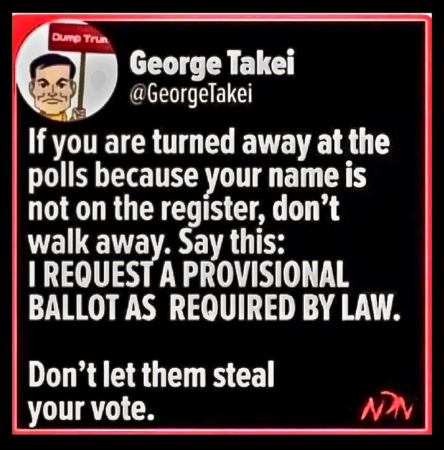
Also, this:
On Election Day, Civil Rights Division personnel will be available all day to receive complaints from the public related to possible violations of the federal voting rights laws by a complaint form on the department’s website https://civilrights.justice.gov/ or by telephone toll-free at 800-253-3931.
Individuals with questions or complaints related to the ADA may call the department’s toll-free ADA information line at 800-514-0301 or 833-610-1264 (TTY) or submit a complaint through a link on the department’s ADA website, at https://www.ada.gov/.
Complaints related to disruption at a polling place should always be reported immediately to local election officials (including officials in the polling place). Complaints related to violence, threats of violence or intimidation at a polling place should be reported immediately to local police authorities by calling 911. These complaints should also be reported to the department after local authorities have been contacted.
More at link: https://www.justice.gov/opa/pr/justice-department-monitor-polls-24-states-compliance-federal-voting-rights-laws
Voter Protection Hotline Numbers (Thanks to Wicked Blue. This chart is from 2022, but the numbers should still be valid.):
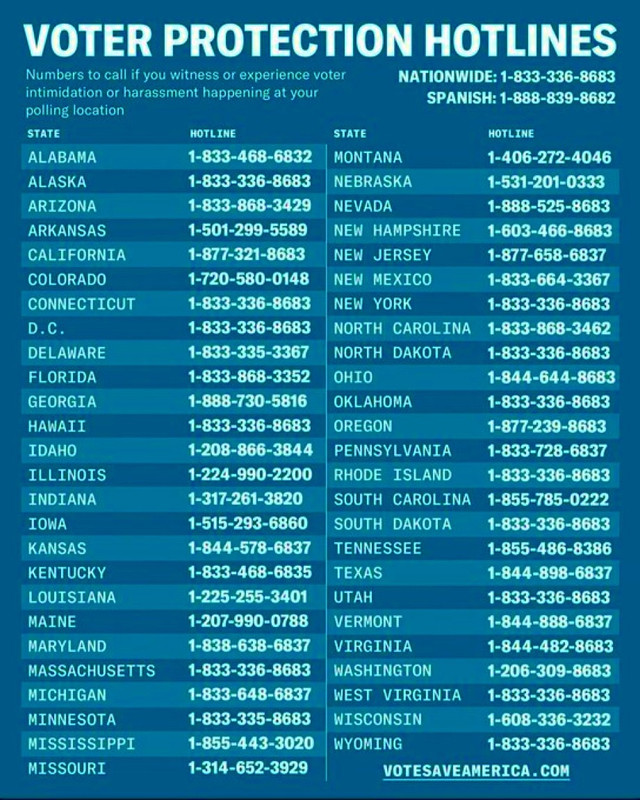
Need help getting an I.D. to vote?
VoteRiders offers free assistance for any eligible voter who encounters barriers to securing his or her ID to vote, including financial and legal help obtaining underlying documents like birth certificates, change of name documentation, etc.
https://www.voteriders.org/staterules/
“The vote is precious. It is the most powerful non-violent tool we have in a democratic society, and we must use it.” – John Lewis, late civil rights activist
Quote by Mousetoescamper:
“Volunteer for a phone bank, neighborhood canvassing, donate to our candidates, vote and encourage others to vote for Democrats.”
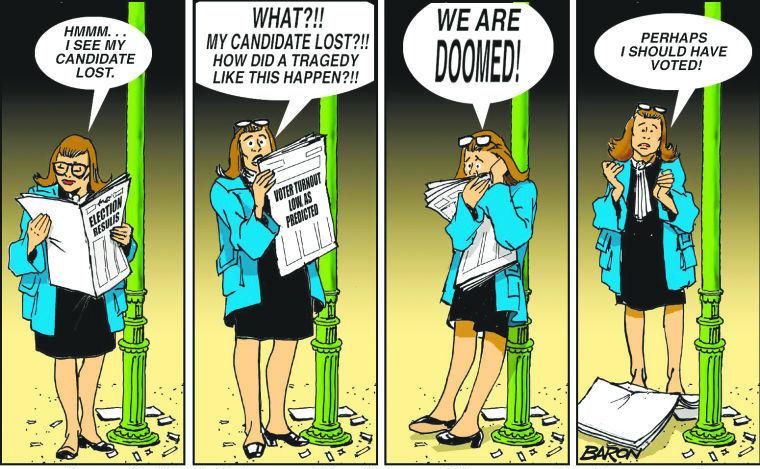
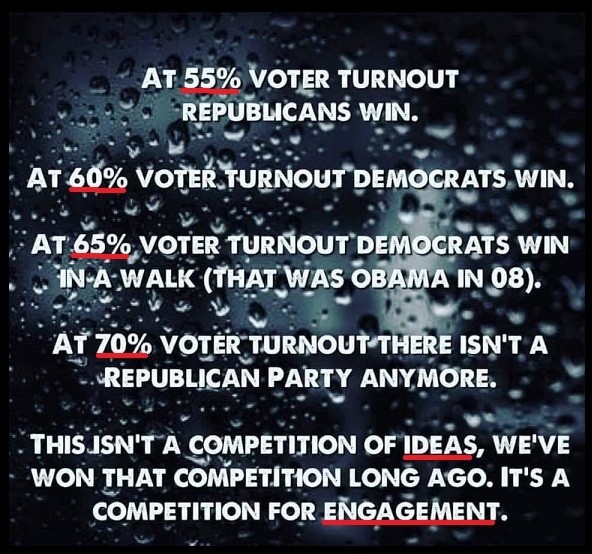
InfoView thread info, including edit history
TrashPut this thread in your Trash Can (My DU » Trash Can)
BookmarkAdd this thread to your Bookmarks (My DU » Bookmarks)
3 replies, 523 views
ShareGet links to this post and/or share on social media
AlertAlert this post for a rule violation
PowersThere are no powers you can use on this post
EditCannot edit other people's posts
ReplyReply to this post
EditCannot edit other people's posts
Rec (2)
ReplyReply to this post
3 replies
 = new reply since forum marked as read
Highlight:
NoneDon't highlight anything
5 newestHighlight 5 most recent replies
= new reply since forum marked as read
Highlight:
NoneDon't highlight anything
5 newestHighlight 5 most recent replies
🎗️ Preparing for Election Day - a Mobilizing Guide for DU Activists 🎗️ (23 Days to Go) (Original Post)
Wednesdays
Sunday
OP
Wednesdays
(19,738 posts)1. Kick.
Wednesdays
(19,738 posts)2. Kick.
Wednesdays
(19,738 posts)3. Kick.